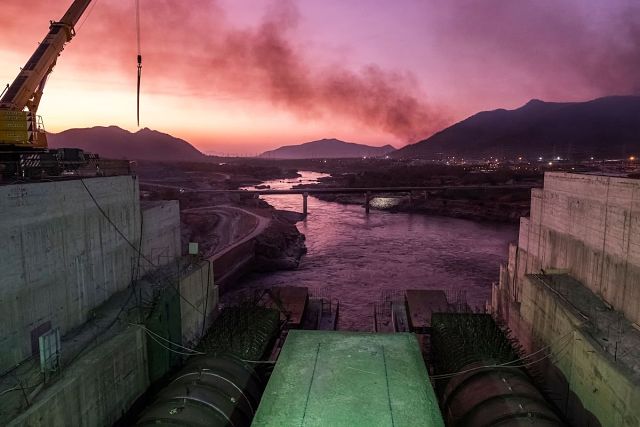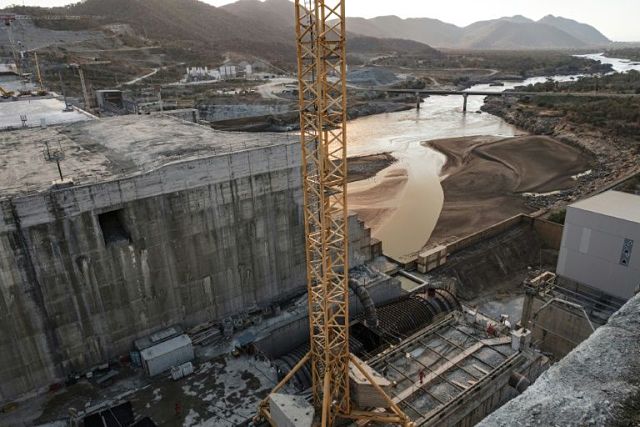 A general view of the Blue Nile river as it passes through the Grand Ethiopian Renaissance Dam (GERD), near Guba in Ethiopia. (Getty Images)
A general view of the Blue Nile river as it passes through the Grand Ethiopian Renaissance Dam (GERD), near Guba in Ethiopia. (Getty Images)
By ELIAS MESERET
Updated: June 12th, 2020
ADDIS ABABA, Ethiopia (AP) — Ethiopia’s deputy army chief on Friday said his country will strongly defend itself and will not negotiate its sovereignty over the disputed $4.6 billion Nile dam that has caused tensions with Egypt.
“Egyptians and the rest of the world know too well how we conduct war whenever it comes,” Gen. Birhanu Jula said in an interview with the state-owned Addis Zemen newspaper, adding that Egyptian leaders’ “distorted narrative” on Africa’s largest hydroelectric dam is attracting enemies.
He accused Egypt of using its weapons to “threaten and tell other countries not to touch the shared water” and said “the way forward should be cooperation in a fair manner.”
He spoke amid renewed talks among Ethiopian, Sudanese and Egyptian water and irrigation ministers after months of deadlock. Ethiopia wants to begin filling the dam’s reservoir in the coming weeks, but Egypt worries a rapid filling will take too much of the water it says its people need to survive. Sudan, caught between the competing interests, pushed the two sides to resume discussions.
The general’s comments were a stark contrast to Ethiopian Prime Minister Abiy Ahmed’s remarks to lawmakers earlier this week that diplomacy should take center stage to resolve outstanding issues.
“We don’t want to hurt anyone else, and at the same time it will be difficult for us to accept the notion that we don’t deserve to have electricity,” the Nobel Peace Prize laureate said. “We are tired of begging others while 70% of our population is young. This has to change.”
Talks on the dam have struggled. Egypt’s Irrigation Ministry on Wednesday called for Ethiopia to “clearly declare that it had no intention of unilaterally filling the reservoir” and that a deal prepared by the U.S. and the World Bank in February serves as the starting point of the resumed negotiations.
Ethiopia refused to sign that deal and accused the U.S. of siding with Egypt.
Egypt said that in Tuesday’s talks, Ethiopia showed it wanted to re-discuss “all issues” including “all timetables and figures” negotiated in the U.S.-brokered talks.
President Abdel-Fattah el-Sissi discussed the latest negotiations in a phone call with President Donald Trump on Wednesday, el-Sissi’s office said, without elaborating.
Egypt’s National Security Council, the highest body that makes decisions in high-profile security matters in the country, has accused Ethiopia of “buying time” and seeking to begin filling the dam’s reservoir in July without reaching a deal with Egypt and Sudan.
—
Ethiopia Seeks to Limit Outsiders’ Role in Nile Dam Talks (AFP)

Ethiopia sees the dam as essential for its electrification and development, while Sudan and Egypt see it as a threat to essential water supplies (AFP Photo)
Updated: June 11th, 2020
Addis Ababa (AFP) – Ethiopia said Thursday it wants to limit the role of outside parties in revived talks over its Nile River mega-dam, a sign of lingering frustration over a failed attempt by the US to broker a deal earlier this year.
The Grand Ethiopia Renaissance Dam has been a source of tension in the Nile River basin ever since Ethiopia broke ground on it nearly a decade ago.
Ethiopia sees the dam as essential for its electrification and development, while Sudan and Egypt see it as a threat to essential water supplies.
The US Treasury Department stepped in last year after Egyptian President Abdel Fattah al-Sisi put in a request to his ally US President Donald Trump.
But the process ran aground after the Treasury Department urged Ethiopia to sign a deal that Egypt backed as “fair and balanced”.
Ethiopia denied a deal had been reached and accused Washington of being “undiplomatic” and playing favourites.
On Tuesday Ethiopia, Egypt and Sudan resumed talks via videoconference with representatives of the United States, the European Union and South Africa taking part.
The talks resumed Wednesday and were expected to pick up again Thursday.
In a statement aired Thursday by state-affiliated media, Ethiopia’s water ministry said the role of the outside parties should not “exceed that of observing the negotiation and sharing good practices when jointly requested by the three countries.”
The statement also criticised Egypt for detailing its grievances over the dam in a May letter to the UN Security Council — a move it described as a bad faith attempt to “exert external diplomatic pressure”.
Ethiopian Prime Minister Abiy Ahmed reiterated Monday that his country plans to begin filling the dam’s reservoir in the coming weeks, giving the latest talks heightened urgency.
The short window makes it “more necessary than ever that concessions are made so a deal can be struck that will ease potentially dangerous tensions,” said William Davison of the International Crisis Group, a conflict prevention organisation.
One solution could involve Ethiopia “proposing a detailed cooperative annual drought-management scheme that takes Egypt and Sudan’s concerns into account, but does not unacceptably constrain the dam’s potential,” he said.
The EU sees the resumption of talks as “an important opportunity to restore confidence among the parties, build on the good progress achieved and agree on a mutually beneficial solution,” said spokeswoman Virginie Battu-Henriksson.
“Especially in this time of global crisis, it is important to appease tensions and find pragmatic solutions,” she said.
—
Join the conversation on Twitter and Facebook.

























